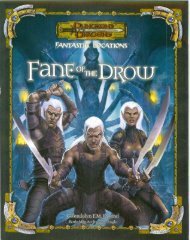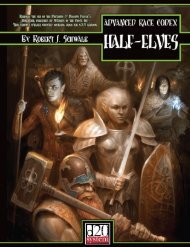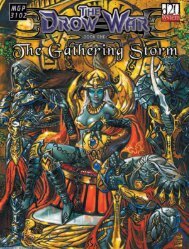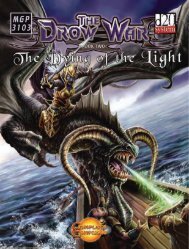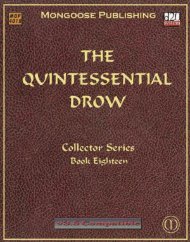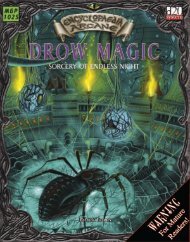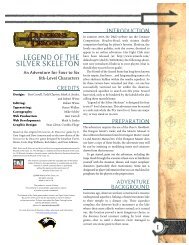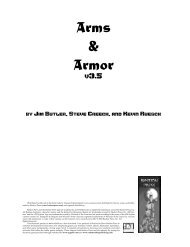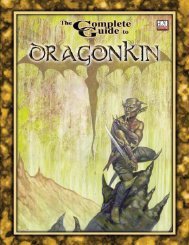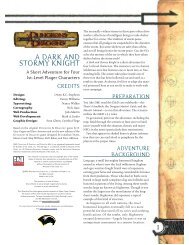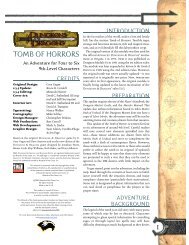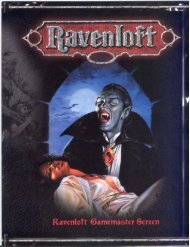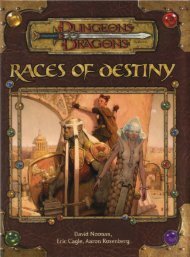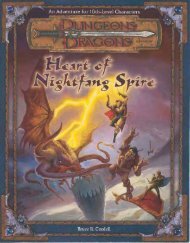Create successful ePaper yourself
Turn your PDF publications into a flip-book with our unique Google optimized e-Paper software.
90<br />
Gaining Power<br />
Character Type Power Provided<br />
Soldier 50 per level of warrior, 100 per level of fighter, barbarian or ranger<br />
Spellcaster 200 per level of cleric, sorcerer or wizard, 150 per level of druid<br />
Agent 25 per level of bard up to 4 th level, then 50 per level. 50 per level of rogue up to 6 th level,<br />
then 100 per level<br />
he is considered to have Rank and can only gain influence<br />
through the means specified later in this section.<br />
Action: A description of the action that is undertaken to<br />
gain Influence. <strong>The</strong>se are general descriptions and can be<br />
expanded by the Games Master as he feels appropriate to<br />
the campaign.<br />
Influence Gained: <strong>The</strong> amount of Influence the Player<br />
will gain, provided his action is successful. This is also the<br />
amount of Influence the Player will lose if his action fails<br />
and he is discovered.<br />
DC: <strong>The</strong> skill check necessary and DC necessary to resolve<br />
the action. Note that the DCs listed here are going to be<br />
higher than those normally associated with various skills.<br />
This is because these DCs represent a series of actions<br />
needed to complete a given task, rather than a single<br />
action. A hired spy, for example, might have to spend<br />
days attempting to gather information, then more days to<br />
make sense of the various rumours he hears and report the<br />
information back to the spymaster, who must then spend<br />
time determining whether or not the information is worth<br />
passing back up the chain of command.<br />
Power<br />
Raw force is not as easily used as Influence, but it is<br />
much easier to obtain and a far more visible deterrent to<br />
enemies who might decide to come after an organisation.<br />
While having a massive amount of Influence may allow an<br />
organisation to subtly alter the course of events in a city, it<br />
does not protect that organisation when armed mercenaries<br />
are kicking down the doors and tossing firepots and spells<br />
through windows. When push comes to shove, no Noble<br />
House, criminal family or temple would be comfortable<br />
without a large force of arms at its beck and call.<br />
But power is not found only in strength in arms. Divine<br />
and arcane spellcasters provide significant power to the<br />
organisations of which they are a part and many mercenary<br />
organisations pay very well for the loyalty of their own<br />
wizards and sorcerers.<br />
To determine the Power available to an organisation, simply<br />
add together the Power ratings found in the table below for<br />
all the guards, mercenaries, family and other members of<br />
the Noble House or organisation. Note that Power can be<br />
increased by a Noble House or organisation at any time,<br />
provided they can pay to keep the guards on staff. If a<br />
House loses guards, either because it can no longer pay<br />
them or because it has suffered a military defeat, then that<br />
House may also lose rank as their Power is decreased.<br />
Rank in the Game of Bones<br />
<strong>The</strong> total of a Noble House or organisation’s Power and<br />
Influence is used to determine the House’s rank, as shown<br />
on the table below.<br />
Rank is an important thing in the Sheathed War. All<br />
combatants are aware of their position in the Sheathed War,<br />
as well as the position of others – at least within a few ranks.<br />
<strong>The</strong> combatants in the Sheathed War do not, of course, refer<br />
to their position by a formal rank number, but they know,<br />
nevertheless, their relative strengths. Strong Noble Houses<br />
and organisations do not have to worry as much about attacks<br />
from their lessers, while weaker organisations constantly<br />
fear both the predations of the strong and the ambitions of<br />
those beneath them. Eventually, most drow cities end up<br />
with one or a few Noble Houses at the top of the heap and<br />
others playing only a small role or withdrawing entirely to<br />
seek their fortunes elsewhere. Those that remain usually<br />
forge alliances with the stronger, if possible. Given the<br />
nature of the drow, of course, such alliances rarely last long<br />
enough for the ink to dry, so Houses who make deals with<br />
Rank Checks<br />
Rank checks are made by rolling 1d20 and adding the rank<br />
of the Noble House or organisation to the result. Rank<br />
checks are most often used in conflicts between Noble<br />
Houses, particularly for actions taken during the Game<br />
of Bones. Rank checks are most useful when they are<br />
not made very often; while the Game of Bones is always<br />
shifting, some constancy must come of it or the system is<br />
no better than the mass anarchy it helps control. As such,<br />
those drow who constantly throw their rank around (i.e.<br />
constantly perform actions that require a rank check) are<br />
likely to lose some of it because of the attention they have<br />
drawn to themselves.



